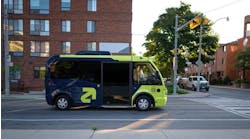Populus releases report on MaaS and the role of cities
Populus has released a new report on Mobility-as-a-Service (MaaS) and mobility management for cities and private operators.
Over the past several years, private fleet operators of shared mobility services, such as Uber and Lyft, have raced to integrate and bundle transportation solutions alongside stand-alone MaaS journey planning mobile applications.
The fundamental concept of a holistic MaaS solution is to enable citizens to plan, book and pay for all of their transportation options—all through one convenient solution that may include mobility ‘subscriptions.’ The commonly espoused objectives of MaaS are to reduce personal vehicle ownership, curb transportation climate impacts and expand equitable and accessible transportation. However, it has become increasingly clear that in order to achieve these societal benefits, public agencies will need to play a central role, says Populus.
This report includes an overview of the current state of MaaS technology, different approaches to deliver MaaS by public agencies and private companies and the role of mobility management to enable the key outcomes desired by cities. Public agencies will need to embrace mobility management strategies that help them evaluate mobility impacts, design data-driven policies, and deploy pricing and incentives.
The report outlines several key building blocks required for the successful delivery of MaaS and mobility management, including:
- Data standards;
- Integrated and open payment technology; and
- Digitization of physical infrastructure and city systems.
“The rise of mobility management solutions paints a clearer path forward on the role that public agencies can play in steering MaaS applications to shape a transportation future that is safer, more equitable and better for our planet,” writes Populus.
The report, “The Transportation Holy Grail: Mobility-as-a-Service (Maas) and Mobility Management” is available for download on Populus’ website.


